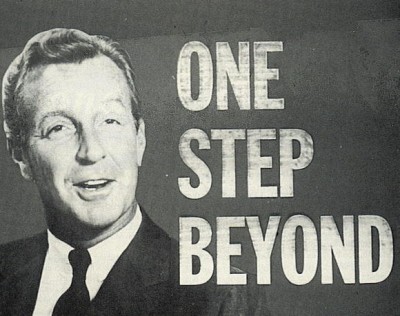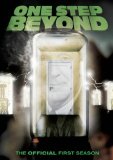| Reviews & Columns |
|
Reviews DVD TV on DVD Blu-ray 4K UHD International DVDs In Theaters Reviews by Studio Video Games Features Collector Series DVDs Easter Egg Database Interviews DVD Talk Radio Feature Articles Columns Anime Talk DVD Savant Horror DVDs The M.O.D. Squad Art House HD Talk Silent DVD
|
DVD Talk Forum |
|
|
| Resources |
|
DVD Price Search Customer Service #'s RCE Info Links |
|
Columns
|
|
|
One Step Beyond: The Official First Season (50th Anniversary Special Edition)
Clearly, the use of "Official" and "50th Anniversary Special Edition" on the cover, as well as some interesting extras, are CBS/Paramount's way of trying to set this release apart from all those cheapo releases, and the good news is that they deliver on that promise and then some. The transfers here are outstanding: the show looks just great, and the modest but interesting extra features give this release of One Step Beyond an extra boost. For fans of classic fantasy-horror, this is a winner all the way.
A half-hour anthology show that beat Twilight Zone to the airwaves by half a season, One Step Beyond (1959-1961) dramatizes supposedly authenticated accounts of psychic phenomenon: communication with the spirit world, premonitions, wild and unexplainable coincidences, etc. "The amazing drama you're about to see is a matter of human record," on-camera narrator John Newland liked to insist. "You may believe it or not, but the real people who lived this story - they believe it. They know. They took that [dramatic pause] one step beyond!"
With a build-up like that, many viewers are surprised to learn that the name of the show originally was in fact not "One Step Beyond," but Alcoa Presents. The still-in-business aluminum producer got its name in the title in exchange for sponsoring the series, like many '50s era shows. When it was syndicated, the title was changed to One Step Beyond and the DVD uses these later titles, though the original version with the "Alcoa" moniker is included as an extra.
Like many viewers, when I first caught up with One Step Beyond in syndication about 30 years ago it struck me as a very tame - too tame - variation of Twilight Zone, and that it too narrowly and ambiguously focused on one particular subject of fantasy - psychic phenomenon - to be of much interest. But looking at it now I'm less inclined to criticize it as something it was never trying to be in the first place, and appreciate its own unique qualities. Basically, its stories and style are more in the tradition of radio shows from the 1940s with a tinge of fantasy than the later Twilight Zone or Outer Limits. What it lacks in variety it compensates in other ways. Indeed, the sameness of the show unexpectedly is part of its appeal.
The series was created by writers Collier Young (Act of Violence, The Hitch-Hiker) and Merwin Gerard (M Squad, Daniel Boone), with the lion's share of episodes written by Larry Marcus. But perhaps the show's biggest asset was John Newland, who not only narrates a la Serling, but who directed all 22 first season episodes.
Where Twilight Zone's first season shows bear Rod Serling's unmistakable stamp in terms of the writing, One Step Beyond is consistently well-directed regardless of the quality of the scripts. TV thespian-turned-director/host Newland seems to have been unusually talented directing actors, and, more than anything else, it's the almost across-the-board fine acting that distinguishes the show; and it's mainly these performances that sell its fantasy core. Where Twilight Zone was rooted in character portraits and wild twist endings, One Step Beyond was more story-driven yarns but whose engine were its emotionally driven characters. In other words, if Zone's characters were the subject of the sentence, in One Step Beyond they function more like the object.
The great line-up of guest stars certainly helped. For instance, Jocelyn Brando (Marlon's underrated actor-sister) is outstanding as a reluctant psychic in "Emergency Only," who eerily predicts the fate of scoffing party guest Clark Howat. (Ross Elliott, sans toupee, is also very good as Brando's husband). In "Epilogue," the wonderful Charles Aidman is superb as a recovering alcoholic trying to convince long-suffering wife Julie Adams to take him back. Aidman's anguish and Adams's mixed emotions are unnervingly convincing here.
Along similar lines, Cloris Leachman is terrific as a photojournalist in Paris, unaware that her mysterious model (Marcel Dalio), an older man with an interesting face, is a ghost who had previously lived in her small flat. Dalio's understated performance - expressed almost totally with his eyes alone - is genuinely creepy, while Leachman's character's descent into a state of near-madness is compelling and believable.
The show seems to work best when it sticks to contemporary stories about ordinary people. Less successful though still interesting are period shows, often incorporating historical events such as the sinking of the Titanic, for instance. Though produced with budgets about par with Twilight Zone (and, like that series, shot at MGM Studios with access to its vast resources) the set dressing of these historical episodes is at times pretty laughable, so inauthentic are some of the props, costumes, hairstyles, etc. On the other hand, episodes like "Premonition" - about a turn-of-the-century girl (Beverly Washburn, very good) refusing to enter her family's ballroom after experiencing a terrifying vision of its huge chandelier crashing on top of her - at least offer creepy basic concepts. (Amusingly, either the scripts or Newland seems to have made sure each episode included at least one bloodcurdling scream. To their credit, these weekly screams are almost always impressive.)
Harry Lubin's all-purpose music is another asset; these first season shows use the same two cues (titled "Fear" and "Weird") over-and over yet they never seem to lose their effectiveness in generating an atmosphere of dread. Lubin's themes are similar to Dominic Frontiere's music for The Outer Limits; not surprisingly, Lubin scored a number of those shows as well.
Guest stars in season one - a Who's Who of '50s anthology regulars - include Virginia Leith, Skip Homeier, Harry Townes, Patrick Macnee, Barbara Lord, Paula Raymond, Bill Quinn, Ivan Triesault, Paul Richards, Jean Allison, Douglas Kennedy, Charles Herbert, William Schallert, Reginald Owen, Philip Tonge, Percy Helton, Thomas Browne Henry, Pamela Lincoln, Paul Langton, Philip Abbott, Joanne Linville, Philip Ahn, Pernell Roberts, H.M. Wynant, Richard Devon, Alfred Ryder, Ben Wright, Patrick O'Neal, Olan Soule, Mike Connors, Yvette Vickers, Olive Deering, Luana Anders, Edward Platt, Sandra Knight, Werner Klemperer, Max Adrian, Robert Webber, Felix Locher, Jon Lormer, Ross Martin, Ed Kemmer, Walter Burke, Sandy Kenyon, Carmen Phillips, Jerry Hausner, Warren Stevens, Barry Atwater, and Leonard Strong.
Video & Audio
One Step Beyond premiered as a midseason replacement, in January 1959. For that reason this Official First Season set has 22 episodes instead of upwards of 39, the usual high-normal back then (though not far from current season runs). Episodes are spread 7-8 per single-sided, dual-layered disc. In their original black and white, full-frame format, they look outstanding, as good as the best Perry Mason and Gunsmoke episodes by the same label, to cite contemporaneous examples. Episodes show little age-related wear, strong blacks and excellent detail throughout. The mono audio is also above average and is closed-captioned. The episodes run an average of 25 1/2 minutes and do not appear cut and are not time-compressed.
Extra Features
Supplements include a very slightly extended version of the original pilot, "The Bride Possessed," produced for peanuts, about $30,000, according to an interview with Newland. Also included is the show's original Alcoa Presents opening, and a strange 1990s main title sequence, created to make the show appear more contemporary, or something. It's now more dated than the original opening titles. Finally, an audio-only archival interview with writer Don Mankiewicz (who wrote an episode called "The Navigator") is helpfully subtitled in light of the poor audio, runs about five minutes.
Parting Thoughts
If you can get past comparisons with The Twilight Zone, on its own terms One Step Beyond is a highly entertaining, slickly produced half-hour fantasy series, at long last available in pristinely-transferred home video versions that do the program justice. I had a ball and can't wait for the "Official" Second Season. Highly Recommended.
Stuart Galbraith IV's latest audio commentary, part of AnimEigo's forthcoming Tora-san DVD boxed set, is available for pre-order, while his latest book, Japanese Cinema, is in bookstores now.
|
| Popular Reviews |
| Sponsored Links |
|
|
| Sponsored Links |
|
|
| Release List | Reviews | Shop | Newsletter | Forum | DVD Giveaways | Blu-Ray | Advertise |
|
Copyright 2024 DVDTalk.com All Rights Reserved. Legal Info, Privacy Policy, Terms of Use,
Manage Preferences,
Your Privacy Choices | |||||||














